Past Events
Matthias Heinkenschloss
Trust-region adaptive stochastic collocation for PDE optimization under uncertainty
Matthias Heinkenschloss
Department of Computational and Applied Mathematics
Rice University
Time & Place
The presentation on June 29, 2015 will be given in the Lukas Klause (Schleinufer 1, 39104 Magdeburg) and starts at 5.00 p.m.
Abstract
I will present a trust-region algorithm with adaptive sparse grids for the solution of optimization problems governed by partial differential equations (PDEs) with uncertain coefficients. The algorithm adaptively builds two separate sparse grids: one to generate optimization models for the optimization step computation, and one to approximate the objective function to evaluate whether to accept the step. The quality of the adaptive sparse grid models is determined by the trust-region algorithm. Conditions on inexact function and gradient evaluations in previous trust-region frameworks are extended to allow the rigorous use of asymptotic (discretization) error estimates for objective function and gradient approximations. Our algorithm often generates adaptive sparse grids that contain significantly fewer points than the high-fidelity grids, which leads to a dramatic reduction in the computational cost. Moreover, the numerical results indicate that the new algorithm rapidly identifies the stochastic variables that are relevant to obtaining an accurate optimal solution. When the number of such variables is independent of the dimension of the stochastic space, the algorithm exhibits near dimension-independent behavior.
Short CV
Matthias Heinkenschloss is professor of Computational and Applied Mathematics at Rice University. His research is concerned with the development, analysis, and applications of algorithms for large-scale optimization problems governed by partial differential equations. He has served/is serving on editorial boards of several professional journals including Mathematical Programming, Numerical Linear Algebra with Applications, and SIAM Journal on Control and Optimization. Prior to joining Rice University in 1996, he was an assistant professor at Virgina Tech (1993-96), and Wissenschaftlicher Assistent at the University of Trier, Germany, (1992-93). He received his doctoral degree in 1991 from the University of Trier, Germany. .
Benoit Chachuat
Trust-region adaptive stochastic collocation for PDE optimization under uncertainty
Dr. Benoit Chachuat
Faculty of Engineering
Centre for Process Systems Engineering
Department of Chemical Engineering
Imperial College London
UK
Time & Place
The presentation on June 29, 2015 will be given in the Senatssaal (building 05, room 205) and starts at 5.00 p.m.
Abstract
I will present a trust-region algorithm with adaptive sparse grids for the solution of optimization problems governed by partial differential equations (PDEs) with uncertain coefficients. The algorithm adaptively builds two separate sparse grids: one to generate optimization models for the optimization step computation, and one to approximate the objective function to evaluate whether to accept the step. The quality of the adaptive sparse grid models is determined by the trust-region algorithm. Conditions on inexact function and gradient evaluations in previous trust-region frameworks are extended to allow the rigorous use of asymptotic (discretization) error estimates for objective function and gradient approximations. Our algorithm often generates adaptive sparse grids that contain significantly fewer points than the high-fidelity grids, which leads to a dramatic reduction in the computational cost. Moreover, the numerical results indicate that the new algorithm rapidly identifies the stochastic variables that are relevant to obtaining an accurate optimal solution. When the number of such variables is independent of the dimension of the stochastic space, the algorithm exhibits near dimension-independent behavior.
Short CV
Matthias Heinkenschloss is professor of Computational and Applied Mathematics at Rice University. His research is concerned with the development, analysis, and applications of algorithms for large-scale optimization problems governed by partial differential equations. He has served/is serving on editorial boards of several professional journals including Mathematical Programming, Numerical Linear Algebra with Applications, and SIAM Journal on Control and Optimization. Prior to joining Rice University in 1996, he was an assistant professor at Virgina Tech (1993-96), and Wissenschaftlicher Assistent at the University of Trier, Germany, (1992-93). He received his doctoral degree in 1991 from the University of Trier, Germany.
Harry L. Trentelman
Model Reduction of Multi-Agent Systems Using Graph Partitions
Prof. Dr. Harry L. Trentelman
Johann Bernoulli Institute for Mathematics and Computer Science
University of Groningen
The Netherlands
Time & Place
The presentation on April 16, 2015 will be given in the Lukasklause (Schleinufer 1, 39104 Magdeburg) and starts at 5.00 p.m.
Abstract
This talk deals with the problem of model reduction of multi-agent systems defined on a graph. Reduced order models are obtained by clustering the vertices (agents) of the underlying communication graph by means of suitable graph partitions. In the reduction process the spatial structure of the network is preserved and the reduced order models can again be realized as multi-agent systems defined on a graph. The agents are assumed to have single-integrator dynamics and the communication graph of the original system is weighted and undirected. The proposed model reduction technique reduces the number of vertices of the graph (which is equal to the dynamic order of the original multi-agent system) and yields a reduced order multi-agent system defined on a new graph with a reduced number of vertices. This new graph is a weighted symmetric directed graph. It is shown that if the original multi-agent system reaches consensus, then so does the reduced order model. For the special case that the clusters are chosen using an almost equitable partition of the graph, we obtain an explicit formula for the H-2 norm of the error system obtained by comparing the input-output behaviors of the original model and the reduced order model. We also prove that the error obtained by taking an arbitrary partition of the graph is bounded from below by the error obtained by using the largest almost equitable partition finer than the given partition. Finally, we extend our results on single integrator dynamics to the case that the agent dynamics is an arbitrary linear input-output system.
Short CV
Harry Trentelman is a full professor in Systems and Control at the Johann Bernoulli Institute for Mathematics and Computer Science of the University of Groningen. From 1985 to 1991 he served as an assistent professor, and as an associate professor at the Mathematics Department of the University of Technology at Eindhoven, the Netherlands. He obtained his PhD degree in Mathematics from the University of Groningen in 1985. He serves as a senior editor of the IEEE Transactions on Automatic Control and as an associate editor of Automatica. He is past associate editor of the SIAM Journal on Control and Optimization and Systems and Control Letters. Dr. Trentelman is a Fellow of the IEEE.
Jan Maciejowski
Fault-tolerant control using Gaussian processes and model predictive control
Prof. Jan Maciejowski
Dep. of Engineering
University of Cambridge
UK
Time & Place
The presentation on January 27, 2015 will be given in the Senatssaal (building 05, room 205) and starts at 5.00 p.m.
Abstract
Essential ingredients for fault-tolerant control are the ability to represent system behaviour following the occurrence of a fault, and the ability to exploit this representation for deciding control actions. Gaussian processes seem to be very promising candidates for the first of these, and model predictive control has a proven capability for the second. We therefore propose to use the two together to obtain fault-tolerant control functionality. Our proposal is illustrated by several reasonably realistic examples drawn from flight control. Some remarks will be made about the use of a Bayesian framework for studying fault-tolerant control.
Short CV
Jan Maciejowski graduated from Sussex University in 1971 with a B.Sc degree in Automatic Control, and from Cambridge University in 1978 with a Ph.D degree in Control Engineering. From 1971 to 1974 he was a Systems Engineer with Marconi Space and Defence Systems Ltd, working mostly on attitude control of spacecraft and high-altitude balloon platforms.
He is a Professor of Control Engineering and a member of the Control Group. He is also the President and a Fellow of Pembroke College, Cambridge. From 2009 to 2014 he was the Head of the Information Engineering Division. He was the President of the European Union Control Association from 2003 to 2005, and was President of the Institute of Measurement and Control for 2002. He is a Chartered Engineer and a Fellow of the Institution of Engineering and Technology (IET), the Institute of Electrical and Electronic Engineers (IEEE), the Institute of Measurement and Control (InstMC), and of the International Federation of Automatic Control (IFAC). He was a Distinguished Lecturer of the IEEE Control Systems Society from 2001 to 2007. He was a member of the IET's Policy Panel for Innovation and Emerging Technologies until 2011.
Paul Goulart
Generalized Gauss Inequalities via Semidefinite Programming
Time & Place
The presentation on December 9, 2014 will be given in the Lukasklause (Schleinufer 1, 39104 Magdeburg) and starts at 5.00 p.m.
Michael Overton
Fast Approximation of the H∞ Norm via Optimization over Spectral Value Sets
Time & Place
The presentation on November 4, 2014 will be given in the Lukas Klause (Schleinufer 1, 39104 Magdeburg) and starts at 5.00 p.m.
Prof. Carsten W. Scherer
From Gain-Scheduling to Distributed Control
Time & Place
The presentation on June 16, 2014 will be given at the Otto-von-Guericke-Universität Magdeburg, Universitätsplatz 2, building 03 - room 106 and starts at 4.45 p.m.
Carsten W. Scherer
Mathematical Systems Theory
Department of Mathematics
University of Stuttgart
Abstract
Linear parameter varying (LPV) systems are described by linear dierential equations whose describing matrices depend on time-varying parameters. The goal in synthesis is to design a controller of the very same structure such that the overall controlled system satises certain desired specications on stability and performance for the entire set of permissible parameter trajectories. The implementation of LPV controllers takes on-line measurements of the time-varying parameters into account in order to improve the performance over robust controllers, compensators without any adaptation capabilities.
In this talk we highlight the challenges in synthesizing controller in order to meet certain desired stability and performance properties. Furthermore, we address a long-standing open problem in robust control and present novel algorithms that allow to systematically reduce conservatism by relying on frequency-dependent stability multipliers. In the nal part of the talk we reveal how the developed framework enables the design of distributed controllers for spatially interconnected systems with reduced conservatism.
Short CV
Carsten W. Scherer received his Ph.D. degree in mathematics from the University of Würzburg (Germany) in 1991. After six months of research at the University of Groningen (The Netherlands), the University of Michigan (Ann Arbor) and Washington University (St. Louis) respectively, Dr. Scherer joined Delft University of Technology (The Netherlands) in 1993 where he held positions as an assistant and associate professor. In fall 1999 he spent a three months sabbatical as a visiting professor at the Automatic Control Laboratory of ETH Zurich. From December 2001 until February 2010 he was a full professor within the Delft Center for Systems and Control at Delft University of Technology. Since March 2010 he holds the SRC SimTech Chair Mathematical Systems Theory in the Department of Mathematics at the University of Stuttgart in Germany.
His main research interests cover various topics in applying optimization techniques for developing new advanced controller design algorithms and their application to mechatronics and aerospace systems. Dr. Scherer acted as the chair of the IFAC technical committee on Robust Control (2002-2008), and he has served as an associated editor for IEEE Transactions on Automatic Control (1997-1999), Automatica (2000-2006) and Systems and Control Letters; he is currently active on the editorial board of the European Journal of Control and various control conferences.
Vortrag: Prof. Jon Lee, Ph.D.
Mixed-Integer Quadratic Optimization: Complexity, Algorithms and Computing
Time & Place
The presentation on June 26, 2014 will be given at the Otto-von-Guericke-Universität Magdeburg, Universitätsplatz 2, building 2 - room 210 and starts at 4 p.m.
Prof. Jon Lee, Ph.D.
U Michigan
Abstract
Mixed-Integer Nonlinear Optimization is the mother of all deterministic optimization models. As such, it has enormous modeling power, with applications in all kinds of areas like manufacturing and transportation logistics, design of water and gas networks, chemical engineering, portfolio optimization, etc. But of course in its full generality, it is foolhardy to consider algorithms and meaningful positive theoretical results. On the other hand, there are many well-known positive results for the linear case, so it is natural to seek to build up from the linear case, to get positive results (both theoretical and computational) for broader models. Natural extensions involve convexity and separability, and their relatives, and polynomials. A natural step in this direction involves attempting to exploit quadratic functions. I will survey some recent results in this direction --- both negative and positive complexity results and practical methods.
Vortrag: Prof. Dr. Alexander Martin
Techniques from Mixed Integer Linear Programming to solve Mixed Integer Nonlinear Programs
Prof. Alexander Martin
Universität Erlangen-Nürnberg
Time & Place
The presentation on April 10, 2014 will be given at the Otto-von-Guericke-Universität Magdeburg, Universitätsplatz 2, building 2 - room 111 and starts at 5.30 p.m.
Abstract
Mixed integer nonlinear programs are currently in the focus of mathematical optimization. The sizes of problems that are actually solvable, however, are still low compared to those solvable when only linear inequalities are involved.We propose a discretization technique to approximate the nonlinear functions by linear ones in an iterative way to meet some given tolerance. This way we are able to apply MIP solution techniques. We will demonstrate the success of this approach on a particular class of applications resulting from gas network optimization.
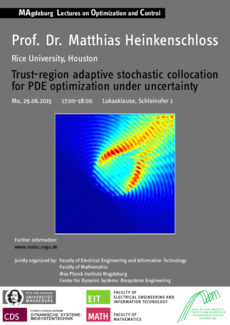
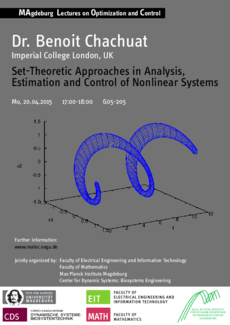
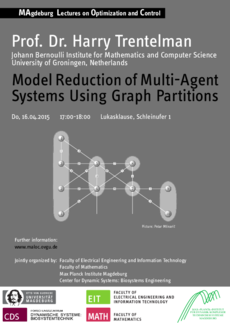
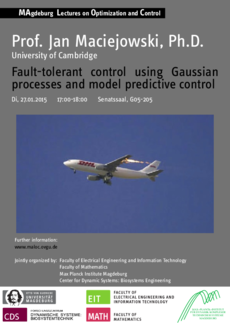
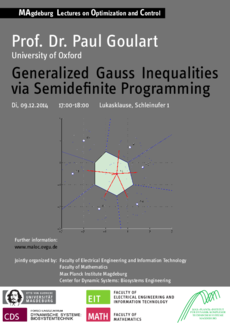
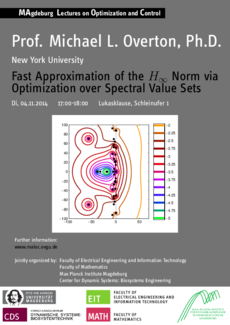
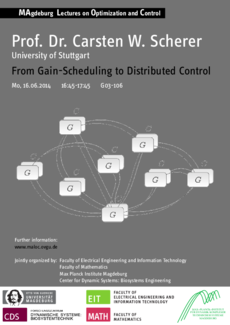
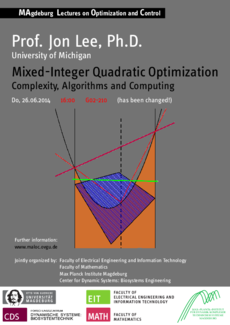
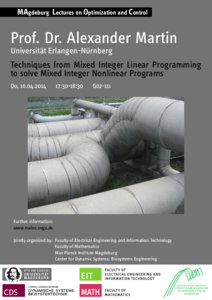
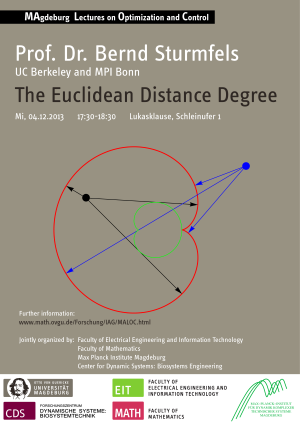
/Joint+Organization/350px_+Joint+Organization-height-116-width-230.png)